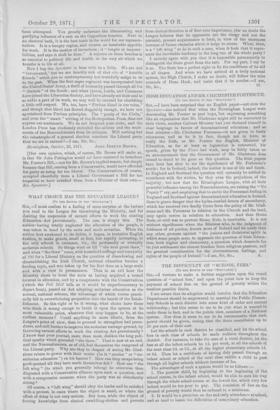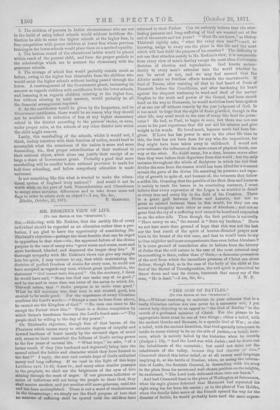THE DIFFICULTY OF " SCHOOL FEES." (To THE EDITOR OF
THE " SPECTATOR.")
venture to make a further suggestion upon the vexed question of " school fees," and upon the point how to keep the payment of school fees on the ground of poverty within the smallest possible limits.
I am aware that its adoption would involve that the Education Department should be empowered to marshal the Public Elemen- tary Schools iu each district into some kind of order and mutual relationship ; but this seems to me to be just what is wanted to make them in fact, and in the public view, members of a National system. or does it seem to me to be unreasonable that such power should be given, seeing that the State contributes up to 50 per cent. of their cost. Let the schools in each district be classified, and let the school fees in each class of schools be made uniform throughout the district. For instance, to take the case of a rural district, let the fees at all the infant schools be I d. per week, at all the schools of the next class 2d. or 3d., at all the higher elementary schools 4d. or 6d. Then let a certificate of having duly passed through an infant school or school of the next class entitle a child to pass through all higher schools without increase of fee. The advantages of such a system would be as follows :- 1. The poorest child, by beginning at the beginning of the school course, in the infant school, would be able to earn his way through the whole school course at the lowest fee, which very few indeed would be too poor to pay. The remission of fees on the ground of poverty would thus be reduced to a minimum.
2. It would be a premium on due and early attendance at school, and so tend to lessen the difficulties of compulsory education. 3. The children of parents in better circumstances who are not in the habit of using infant schools would without invidious dis- tinction bo able to enter the higher schools at the higher foes, in free competition with poorer children at lower fees whose previous training in the lower schools would place them on a merited equality.
4. The bottom round of the educational ladder would be placed within reach of the poorest child, and form the proper prelude to the scholarships which are to connect the elementary with the grammar schools.
5. The average of school fees would probably remain much as before, owing to the higher foes obtainable from the children who would enter the higher schools without having passed through the lower. A rearrangement of the Government grant, increasing its amount as regards children with certificates from the lower schools, and lessening it as regards children entering at the higher fees, but without altering its total amount, would probably be all the financial arrangement required.
6. As the certificates would be given by the Inspectors, and be Government certificates, there would be no reason why they should not be available in reduction of fees at any higher elementary
school in the district according to the parents' choice, or even, under proper rules, at the schools of any other district into which the child might remove.
Lastly, this marshalling of the schools, whilst it would not, I think, unduly interfere with their freedom of action, would tend to
accomplish what the conscience of the nation is more and more
demanding, viz., that proper subordination of their sectional to their national object, which alone can justify their receipt of so large a share of Government grant. Probably a good deal more marshalling will be needful before national provision is made for half-time sohooling, and before compulsory education is made universal.
Is not something like this what is wanted to make the educa- tional system of England truly national ? And would it not be worth while on the part of both Nonconformists and Churchmen to merge some sectarian differences and to take down some red flags in order to attain such an object 2-1 am, Sir, 8rc.,



































 Previous page
Previous page